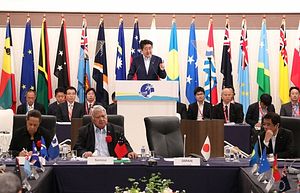Japan has sought to deepen its ties to the Pacific Islands by rolling out a capacity-building program for 500 people, aimed at upholding maritime order and sustainable ocean management.
Prime Minister Shinzo Abe unveiled the measures, to be carried out over the next three years, as he hosted the 8th Pacific Islands Leaders Meeting (PALM) in Japan’s Fukushima prefecture on May 18 and 19. The pledge underscored a greater focus at this year’s summit on maintaining a free and open maritime order based on the rule of law – a key priority of Japan’s diplomacy at a time when China is exerting ever-growing influence in the region.
Japan has not been standing still when it comes to deepening links to the Pacific Islands: at the previous PALM meeting, three years ago, it announced a 55 billion yen ($460 million) assistance package for the region. Construction of one element of that plan, the Pacific Climate Change Center in Samoa, began earlier this month. And Japan has been working to boost its diplomatic presence in the region, including with the dispatch of business missions. People-to-people exchanges are also expanding.
The PALM process is a key vehicle for Tokyo to enhance such relationships. It provides a chance for the Japanese prime minister to meet every three years with leaders and representatives from Pacific Islands Forum members, including Australia, the Cook Islands, the Federated States of Micronesia, Fiji, French Polynesia, Kiribati, the Marshall Islands, Nauru, New Caledonia, New Zealand, Niue, Palau, Papua New Guinea, Samoa, Solomon Islands, Tonga, Tuvalu, and Vanuatu. The summit-level initiative began in 1997.
In this year’s joint statement, the members sketched out a strategic vision for their partnership, starting with maintaining stability through rules-based order. This element boiled down to respecting sovereignty, the rule of law, and the peaceful resolution of disputes in accordance with international law. Other points in the shared vision included “self-sustained and sustainable” economic development; active people-to-people exchanges; and robust regional institutions with a view to achieving even greater regional cooperation and integration.
In a speech, Abe said the countries would work together on upholding the maritime order in the Pacific, because “it is the rule of law that gives protection to the nations, big and small, for their inherent rights.” Perhaps anxious to avoid the appearance of a big power dictating to smaller ones, Abe also told his Pacific counterparts that Tokyo would “work to develop quality infrastructure in both ‘hard’ and ‘soft’ aspects so that you are able to realize sustainable prosperity in a self-reliant manner.”
This comes amid intense focus on China’s role in the region, which includes the expansion of aid funding and provision of low-interest loans for sometimes-criticized infrastructure projects. The joint statement said the leaders believed that projects including sea ports and airports should be developed “in an open, transparent, non-exclusive and sustainable manner, in accordance with international standards, which also respect sovereignty and peaceful use of such infrastructure.”
When asked at a media briefing whether PALM’s emphasis on maritime order and high-quality infrastructure had any connection to China’s activities, a Japanese foreign ministry official replied: “This is a common standard, a common idea, a common vision – everyone can share it – so it is not directed at China.” Another official at the briefing added that Pacific Islands had particular concerns about illegal fishing and organized crime at sea, and those issues could be addressed under the rule-of-law banner.
For the first time, the PALM joint statement included a section on North Korea – another key concern for Japan, which has continued to argue for a “maximum pressure” approach toward the regime. The leaders voiced appreciation for the inter-Korean summit held in late April and expressed hope that the anticipated meeting between U.S. President Donald Trump and North Korean leader Kim Jong-un “would deliver North Korea’s concrete actions” for denuclearization. They raised concerns about North Korea’s use of “ship-to-ship” transfers of goods to evade sanctions, and vowed to comply with UN Security Council resolutions “by deregistering North Korean trading or fishing vessels currently flagged on their shipping registers.”
The PALM declaration once again included a major focus on climate change, although the language has been strengthened since last time. The statement said the issue must be addressed “with a sense of urgency” because it was an “existential threat” and would pose security challenges across the region, especially for island countries. Consequently, the leaders intended to strengthen their leadership role in international negotiations in an effort to limit temperature rise to 1.5 degrees Celsius above pre-industrial levels. They added that there was a need to mobilize financial support for climate change action that was commensurate with each country’s needs.
Ahead of the next PALM scheduled for 2021, Japan will seek to further deepen its ties across the region. This is expected to include high-level mutual visits to bolster bilateral relationships. The leaders have also signaled that they could “pursue the possibility of greater defense and security exchanges and cooperation,” although any details on that front are yet to be fleshed out.

































